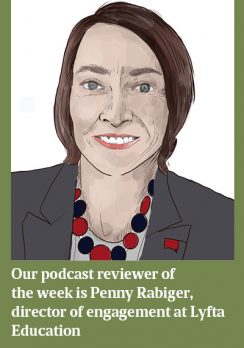Rights-respecting schools, bringing civil rights into the classroom, the post-COVID curriculum, recovery in special schools and home learning before the internet are Penny Rabiger’s top picks of the edu podcast topics
@moreteachertalk
MoreTeacherTalk describes itself as devoted to producing podcasts that give teachers a voice, sharing insights that can lead to powerful change. This episode is with Dr Kulvarn Atwal, a London head, who shares his insights into how schools can become safe and inspiring places by becoming “rights-respecting schools” and placing the UN Convention on the Rights of the Child at the heart of their community. Drawing on real-world experience and his expertise in successful school improvement strategies, Atwal demonstrates how we can give children a voice through authentic, compassionate leadership with transformational outcomes for schools. He talks about behaviour, exclusions, curriculum and values-led approaches to leadership.
@wosdec
Many educators have been thinking about how we might address recent world events with the young people we teach. Building on the concept of rights-respecting schools and young people as engaged citizens, this West of Scotland Development Education Centre (WOSDEC) podcast looks at practical ideas for citizenship and how we can bring global ideas into the classroom. The episode I have chosen, When Mandela danced in the square, was made to sit alongside a useful resource and to inspire and encourage educators to bring the issues of apartheid, civil rights and racism into their teaching, while making connections to history and current affairs, locally and globally.
Cornerstones: The curriculum podcast
@Cornerstonesedu
Mary Myatt, an education adviser, speaker and writer on curriculum matters, discusses the implications of this period of curriculum disruption. She looks at national curriculum coverage, forward planning, the importance of curriculum coherence and the balance of knowledge and skills in primary curricula. She is challenging, insightful, practical and inspirational, reminding us that including the full range of lived experience in our school communities is integral to successful curriculum design and delivery.
@EfL_Insights
The idea of a “recovery curriculum” has gained a lot of traction and currency as schools slowly reopen to all pupils. Professor Barry Carpenter has hosted a series of conversations with school leaders, practitioners and researchers to explore and develop what such a thing might look like in the context of a school’s existing curricula. Here, Vijita Patel, the head of a special school in west London, considers the strategic implementation of a recovery curriculum for children with special needs,. She does this from a stance of compassionate leadership, with a clear focus on engagement in learning. Her penetrating analysis shows how children’s needs should inform organisational judgments, and that the emotional wellbeing of each child should be a constant focus. Patel asserts that a mutually respectful relationship with families as co-educators is vital – especially now.
@bbcworldservice
Just for fun, I decided to go back in time in the BBC World Service archives and found myself cruising episodes of the 1980s programme, Education Today, where my eye (or ear) was caught by a programme from May 1988 about the worldwide education service to support homeschooling. The episode looks at alternative ways of educating young children at home while providing them with a full curriculum. All of this was before the internet, before households had home computers or even colour TVs. It’s fascinating to consider this against the backdrop of our lockdown experience of home learning, the digital divide and concern about disadvantage gaps. I would urge policymakers beavering away at plans for an army of tutors to offer catch-up programmes to have a listen. Innovation might be found in ideas from the past, rather than in imagining what the future might yield.













Your thoughts